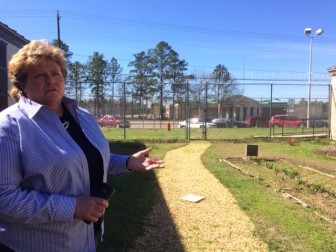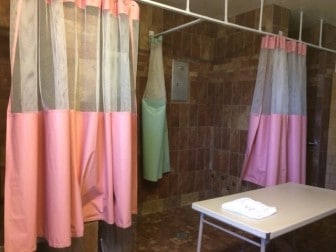Morale Improved at Tutwiler After Reforms
Wendy Williams is very popular at Julia Tutwiler Prison. As Deputy Commissioner for Women’s Services, inmates know who she is and why she’s there. Williams oversees the process of several reforms handed down in a settlement with the U.S. Department of Justice in 2015.
Following an investigation, the DOJ found that inmates at Tutwiler were victims of rampant sexual assault and physical abuse. The investigation also revealed the Alabama Department of Corrections (ADOC) failed to hold staff accountable. The state was forced to overhaul operations and change administration at Tutwiler. Part of the reforms involved hiring staff, like Williams to ensure these changes were being made.
Williams also monitors rehabilitation programs that arose from reforms. This includes Tutwiler’s newest amenity, a beauty salon the inmates call Cuts and Curls.
The salon came about after ADOC changed its hair policy and began allowing female inmates to grow their hair long. The women suddenly needed a place they could get their hair done and prison officials said “okay.” Inmates love the beauty salon, but they’re also excited about other new and uplifting experiences. Just ask 55-year-old Dedree Crane about pizza and movie night.
“This is something nice. To be able to watch a movie in peace and not have five people up there in front of you going, ‘You know I already know what’s going to happen.’ You know this way you actually get to enjoy that movie and you get pizza. Pizza from the free world,” she says.
Crane has been at Tutwiler for 22 years and she’s up for parole this year. She says life before the reforms was rough. She would walk the halls praying to be invisible so the warden and guards wouldn’t harass her. But Crane says that’s all changed and the women no longer live in fear of prison authority.
“Oh yes! Oh yeah! And you’re not afraid to express how you feel. You’re not afraid to say, ‘hey this is going on.’ I could go to any officer right now. I would feel just as comfortable talking to any one of them and I know that I would be safe,” she says.
For years, inmates at Tutwiler were subject to cross-gender strip searches and some male corrections officer would watch while inmates showered and used the bathroom. This created a hyper-sexual environment and increased the potential for harassment and sexual abuse, according to an investigation by the Equal Justice Initiative.
A major part of the reform process started by making policies gender responsive. “So in other words taking a policy and looking at it through the lens that these are women offenders, male offenders,” Williams says.
Now, bathrooms have partitions and shower curtains and male guards must give a warning before entering sensitive areas.
There’s also been a diversity sea change. In the past, the majority of officers at Tutwiler were male. But ADOC has since beefed up its recruiting program,“…and put a lot of resources into recruiting female officers for Tutwiler. And we can now report that we have 70 percent female officers and 30 percent male officers. So that in itself has made a big difference,” Williams says.
The shift in officer diversity coupled with special programming like pizza and movie night have helped improve morale and inmate self-esteem, which is important for rehabilitation, Williams says.
Charlotte Morrison, with the Equal Justice Initiative, says just having Wendy Williams there to oversee the process is as important as the reforms themselves.
“Having someone who is accountable and whose role it is to talk to the women, to find out what the problems are, to be aware when there’s certain patterns going on,” Morrison says. “I mean that’s what we saw. You could spend just a couple of days in that prison in 2011 and see what the pattern was.”
Morrison says the reforms so far have improved the lives of inmates at Tutwiler, but she says there’s still a long way to go.
Birmingham is 3rd worst in the Southeast for ozone pollution, new report says
The American Lung Association's "State of the Air" report shows some metro areas in the Gulf States continue to have poor air quality.
Why haven’t Kansas and Alabama — among other holdouts — expanded access to Medicaid?
Only 10 states have not joined the federal program that expands Medicaid to people who are still in the "coverage gap" for health care
Once praised, settlement to help sickened BP oil spill workers leaves most with nearly nothing
Thousands of ordinary people who helped clean up after the 2010 BP oil spill in the Gulf of Mexico say they got sick. A court settlement was supposed to help compensate them, but it hasn’t turned out as expected.
Q&A: How harm reduction can help mitigate the opioid crisis
Maia Szalavitz discusses harm reduction's effectiveness against drug addiction, how punitive policies can hurt people who need pain medication and more.
The Gulf States Newsroom is hiring a Community Engagement Producer
The Gulf States Newsroom is seeking a curious, creative and collaborative professional to work with our regional team to build up engaged journalism efforts.
Gambling bills face uncertain future in the Alabama legislature
This year looked to be different for lottery and gambling legislation, which has fallen short for years in the Alabama legislature. But this week, with only a handful of meeting days left, competing House and Senate proposals were sent to a conference committee to work out differences.










